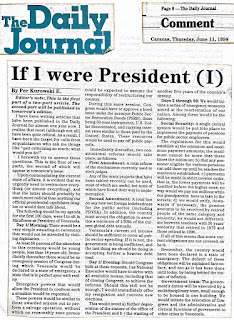Pay now and pray for the light
Over the years, the nation’s public sector has slowly but surely built up a relatively widespread infrastructure base. This was evidently financed basically by income from petroleum sales. Among these infrastructure systems we can find the Nueva Esparta State power and energy system (SENE). Today’s cash crunch has forced the government to study the possible sale of SENE by its owner, i.e. the Venezuelan Investment Fund (FIV), hoping thereby to recoup its investment.
SENE’s value today, as a power concession, is based more on the cash flows that are derived from the tariffs, than on the value of a bunch of electrical baggage. As a result of this, the FIV, in its role as seller, is interested in proving to potential buyers that there is a real possibility of charging high tariffs for its electricity.
FIV’s spokesmen have pegged SENE’s value in the market at US$ 100 million. Should this actually be the final value of the sale/purchase transaction, the island’s population, industry and commerce, whether they like it or not, will have to repay the investment, including corresponding dividends, by way of increased tariffs. The same happened with CANTV. Today’s high phone bills are a direct result of the elevated price paid the government by the investors that acquired the communications monopoly.
In the case of the Margarita power system, we must add the investments that are urgently required in order to provide satisfactory service to users on the island to the initial investment. The result is evident; a horrifyingly high electricity bill.
Any privatization of a public service should be aimed at insuring that a continuous and acceptable service is made available to its users, at a reasonable cost. On the contrary, the SENE privatization looks like a totally different concept, one in which the sale is used cover up ulterior fiscal necessities. This is clearly evidenced by the fact that the allocation will be made to that bidder that “offers the highest price, on strictly cash terms and without any financing from the Venezuelan State”.
On the FIV’s Web Page on the Internet, the agency declares that: “As far as the supply of primary energy to the before mentioned Island is concerned, the Economic Cabinet has decided that the winning bidder must present the National Executive, after the public bid, and no later than six months after the same, with an investment plan detailing the minimum cost associated with the delivery of the service, which must in turn reflect the tariffs to be applied”.
The above declaration, could in the layman’s terms be interpreted as saying “Pay us now and let us know within six months what you are going to do with regards to the Islands needs”. As such it would confirm the existing fiscal voracity and the general indifference of authorities with Margarita’s well being. I am one of the most arduous defenders of privatization around, and therefore I hereby express my most vehement protest.
In this same context, another example of fiscal voracity related to the Island’s needs is the gas pipeline. This alternative was never designed to include the possibility whereby the owner of the gas (Corpoven) would have to lay the pipeline in order to insure sales of the gas to Margarita. On the contrary, this alternative was always based on the scheme whereby the island was to pay for the pipeline in order to acquire the “right” to purchase the gas (nice guys, what?). Most assuredly, as instructed by the IMF, the price of this gas is to be pegged to international market levels.
Everyone is well aware that the energy problems on the Island must be solved, and quickly. I have been one of the victims of burnt-out compressors, rotten food in my refrigerator, etc, and therefore am among the first to assert that the costliest service is the bad one or worse, the one you don’t receive at all. However, I do believe that celerity is not incompatible with intelligence.
Before allowing the Venezuelan State to get rid of SENE and therefore of a responsibility, which it had taken upon itself voluntarily in the first place, in the search for political benefit, Nueva Esparta should request authorities to lay a submarine cable that would allow it to purchase cheap hydroelectric power from Edelca. This it is done in most other parts of the country, even in more remote areas such as the State of Zulia. We had also planned to do the same with exports of power to Brazil and Colombia. Why, then, not Margarita?
As a minimum, the Island should try to ensure that all income raised by the sale of SENE should be deposited in an escrow account aimed at financing sorely needed investments on the Island.






